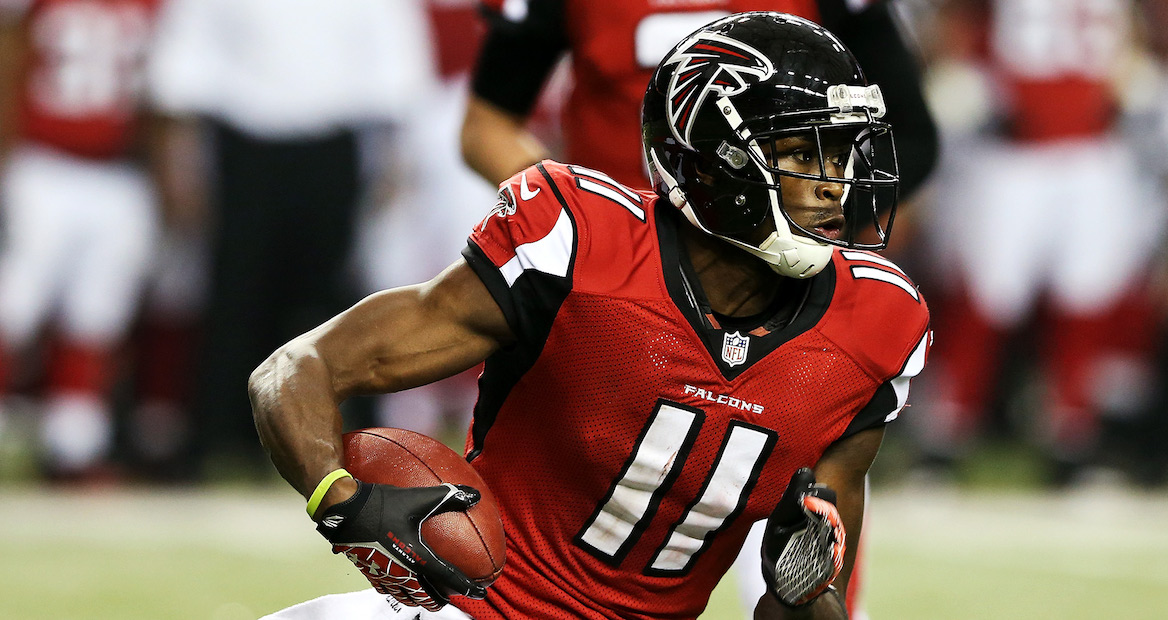
Atlanta Falcons Buying Guide: All praise Julio Jones
With fantasy draft day fast approaching, Pat Fitzmaurice is taking a team-by-team look at every key player’s fantasy value relative to his current ADP (average draft position). Next up: The Atlanta Falcons in the post-Kyle Shanahan Era
I’ve been keeping vigil for the word “regression,” which has been so beaten to death by fantasy writers that it is now in a medically induced coma. The brutal beating doled out to regression is similar to the one Sonny Corleone gave Carlo Rizzi in “The Godfather,” the difference being that Carlo had it coming; he wasn’t going to get away with hitting a Mafia don’s daughter. Poor regression is an innocent, well-meaning noun guilty of nothing more than bringing overinflated numbers back to earth. It didn’t deserve this. Please keep regression in your prayers.
Yes, Matt Ryan’s touchdown total is likely to fall, just as it was likely to rise after it plummeted to a six-year low in 2015. Ryan’s 38 touchdown passes last season were six more than his previous career high and 17 more than he had thrown the year before. Before these two outlier seasons, Matthew T. Ice threw 26 to 32 touchdown passes every year from 2010 to 2014, so it seems reasonable to project him for about 30 TDs this season. Couple that with his five-year average of 4,693 passing yards and you have a solid fantasy starter. Ryan’s ADP of QB4 is one spot higher than I have him, but it’s not the ranking vis-à-vis other quarterbacks that vexes me. Ryan is coming off the board in the middle of the fifth round, on average, which is egregiously early for single-QB leagues. There might be a handful of quarterbacks who warrant a fifth-round pick, but Ryan isn’t one of them. His MVP performance in 2016 has priced him out of the buy zone.
MORE FANTASY: 2017 Complete Player Rankings
Atlanta is the rare team that offers fantasy owners two startable running backs and only one startable wide receiver, which is a bit like an apartment having two living rooms and only one bedroom. But Julio Jones offers a very comfortable bedroom, and his owners tend to sleep peacefully on chilly autumn nights.
Antonio Brown is the nearly unanimous WR1, and for most owners the choice for WR2 comes down to Jones and Odell Beckham Jr. A parsing of the numbers does little to create daylight between the two. Beckham has been the more prolific TD scorer. Jones plays with the better quarterback and has less intramural competition for targets. I initially had Beckham ranked higher but defected to Team Julio. Either is a worthy fifth or sixth overall draft pick. ’Nuf said.
Taylor Gabriel has a Fantasy Football Calculator ADP of WR55, with Mohamed Sanu not far behind at WR61. Sanu had a catch rate of 72.8% last year but averaged just 5.4 targets per game. The aforementioned Julio Jones averaged 11.9 targets per game over a three-year period from 2013 to 2015 but only 9.2 targets last season. It’s hard to imagine Sanu playing a bigger role when Jones appears destined for a target boost. In larger leagues with more generous roster sizes, Sanu might be worth speculating on, simply because he’d become startable in the event of a Julio injury. I have no interest in the gadgety Gabriel, whom Kyle Shanahan schemed into relevance last year. Gabriel averaged an obscene 11.8 yards per target last season and scored touchdowns on 17.1% of his catches, making him an obvious candidate for regress— … um, for worse numbers than last year.
Speaking of numbers due for correction, Tevin Coleman led all running backs in fantasy points per route run last season, averaging 2.58, according to Pro Football Focus. James White was a distant second at 1.90. Coleman didn’t have more than 25 catches in any of his three seasons at the University of Indiana. He had three TD catches last year after having none in college and none in his rookie season. Coleman also had eight rushing touchdowns on 118 carries last year. So he’s a sucker play, right? Actually, I think he’s a nice value at a cost of RB31. Coleman has been productive at the college and pro levels, he has extraordinary speed, and he runs behind one of the NFL’s best offensive lines. Coleman is startable even though he’s on the short end of a time-share arrangement with Devonta Freeman, and if Freeman were to go down, Coleman would instantly become one of the five or six most valuable running backs in fantasy. I won’t get out over my skis in pursuit of Coleman, but I like him at his current going rate.
Freeman finished RB6 last year and RB1 in 2015. He has an ADP of RB6 and is typically coming off the board in the back end of the first round. Some will argue that DeMarco Murray, Jay Ajayi and Jordan Howard should all outrank Freeman since they project to get more carries. I find it hard to quibble with a player who’s churned out 3,175 yards from scrimmage and 27 touchdowns over the last two seasons at easily repeatable efficiency rates. And it bears repeating: The Falcons’ offensive line is very, very good.
We haven’t forgotten about the Atlanta tight ends, though they’ve been mostly forgettable since the retirement of Tony Gonzalez following the 2013 season. Austin Hooper offers a glimmer of hope, however. As a rookie, Hooper caught only 19 passes in the regular season but had a catch rate of 70.4% and averaged 14.3 yards per reception. He also had six catches in Atlanta’s three playoff games, including a 19-yard touchdown catch in the Super Bowl. With an ADP of TE15, Hooper is worth a look in the sort of larger, big-roster leagues where it’s imperative to draft a backup tight end.
| PLAYER | ADP | FITZ RANKING | RECOMMENDATION |
| Matt Ryan | QB4 | QB5 | Don’t reach |
| Devonta Freeman | RB4 | RB3 | Pay respect |
| Tevin Coleman | RB31 | RB27 | Snare |
| Julio Jones | WR2 | WR2 | Genuflect |
| Taylor Gabriel | WR55 | WR70 | Avoid |
| Mohamed Sanu | WR61 | WR60 | Acknowledge |
| Austin Hooper | TE15 | TE15 | Buy late |




